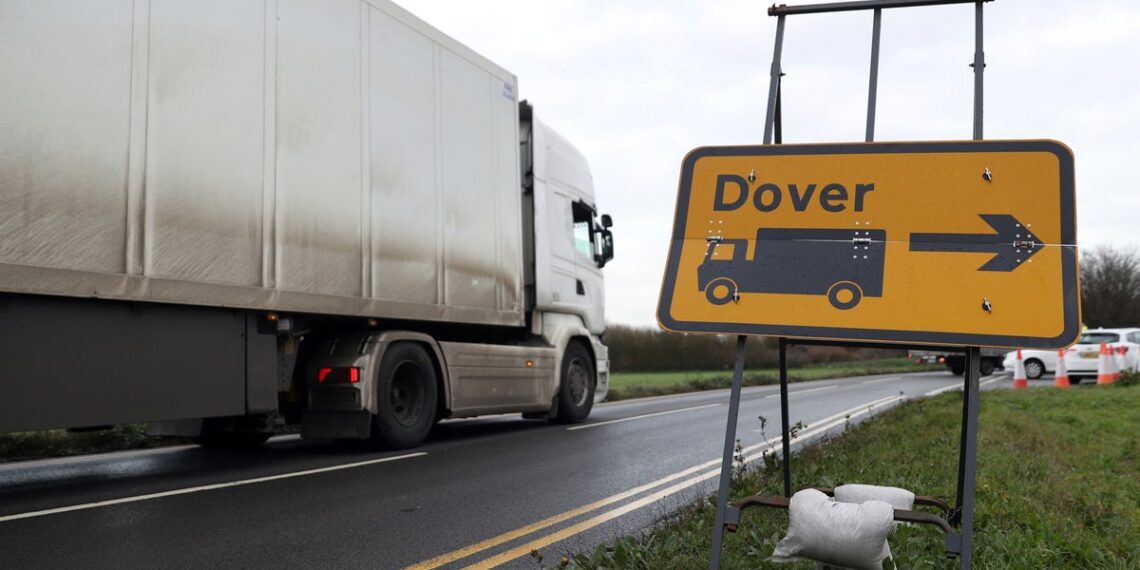orry drivers are already spending a mean of three% to five% longer navigating UK borders on account of new post-Brexit purple tape, new knowledge has revealed.
Consultants warned at the moment that these delays are solely set to worsen, and can trigger “actual issues” for the trucking trade, and a few just-in-time meals suppliers.
It got here as a survey for the Chartered Institute of Procurement & Provide discovered that greater than half of the UK firms importing or exporting items via the EU border have suffered delays this month, largely attributable to post-Brexit paperwork.
Put up-January 1, firms have needed to fill in new kinds akin to export well being certificates and declarations, with many dealing with complicated new responsibility guidelines. It has left truckers with the unsuitable paperwork stranded at borders throughout the Continent, with time-sensitive meals exports dealing with prolonged delays in transit, and even – as within the case of some Scottish seafood exporters – going to waste.
Stephan Sieber is chief government of German logistics software program agency Transporeon, which tracks lorry flows via Europe in actual time. The agency’s Dwell Tracker collects GPS knowledge exhibiting how lengthy vehicles are queuing at each border crossing.
Sieber informed the Commonplace that based mostly on evaluation of motion of tens of hundreds of lorries, presently truckers’ UK border crossing time is round “Three to five% up” on common, and warned that the quantity and size of those delays are prone to enhance because the “liquidity crossing the Channel at this level is unusually low” and has already picked up over the past week.
He stated: “In the event you’re a trucking firm, having 30-60 minutes extra ready time is definitely a problem. It’s a actual downside because the margins in these companies aren’t tremendous excessive.
“A truck is barely value one thing if a truck is shifting. 10,000 vehicles daily spending an additional hour on the border, that’s 10,000 hours of trucking capability misplaced.
“For the logistics service suppliers, 5-10% longer ready occasions on the Port of Dover is an enormous factor.”
Transporeon’s newest knowledge additionally reveals that within the second week of January the rejection fee for transport to the UK – the speed of firms based mostly within the EU refusing to journey to Britain – was up 168% on the third quarter common, resulting in elevated costs for vehicles to the UK on the last-minute “spot market”.
Final week the main German logistics agency DB Schenker suspended companies to the UK attributable to “important” issues attributable to post-Brexit purple tape.
“During the last two to a few weeks we’ve continued to see exceptionally excessive rejection charges and considerably increased spot charges than we had seen previous to the year-end,” Sieber stated. “Not surprisingly, at this time limit, many logistics firms are preferring to drive domestically or inside continental Europe than take that uncertainty and the burden of going into the ‘unknown territory’ of crossing the border into the UK.”
The Street Haulage Affiliation confirmed to the Commonplace that’s seeing corporations “warning of not wanting to return to the U.Okay.” as a result of “nightmare” paperwork on the Port of Dover and new permits required by post-Brexit purple tape, “even earlier than all the problems round Covid testing occurred”.
Spokesperson Paul Mummery stated: “The arrogance of firms [to come here] has been dented given the delays and the prices.
“As volumes enhance it should get tougher for companies. Issues will worsen earlier than they get higher.”
The Meals and Drink Federation additionally warned the Commonplace that additional disruption to the trade is prone to come.
A spokesperson stated: “UK exporters of seafood have already been badly impacted by the choice of logistics firms to briefly cease carrying their merchandise. As commerce volumes enhance, there’s a better probability that different sectors of the foods and drinks trade will likely be impacted by disruption at ports and borders.
“We proceed to liaise frequently with the UK governments and EU authorities to make sure they’re conscious of any points arising, and to hunt fast resolutions.”
Sieber stated that we should wait till March – when the sector historically turns into a lot busier with extra shipments for manufacturing and building – for the true check of whether or not these “new market dynamics – akin to increased costs and better spot charges for the UK are structural and can keep round for the longer term” to trigger long-term harm.
Cupboard Workplace minister Michael Gove has stated that the Authorities has been stepping up its communications effort “to be sure that enterprise is aware of what’s required” in relation to the brand new purple tape. Ministers have made it clear for a very long time that there can be some disruption on the finish of the transition interval.
Supply: www.standard.co.uk


